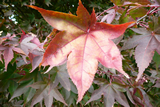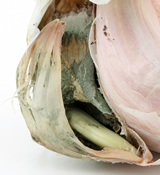If you're having trouble reading this from your email, click here to access it through your internet browser.


Ornamental plants
- Cut herbaceous perennials which have finished flowering down to ground level. Compost the cuttings (unless they are diseased).
- Early this month cut decorative seedheads for drying.
- Don’t let fallen leaves remain on the crowns of plants as they could cause rot.
- Hardy perennials such as bergenias, pinks/carnations, geraniums and violas can be divided this month.
- If you live in a cold area, dig up cannas, gladioli and dahlias when they have finished flowering, for dry storage overwinter.
- If you want to save tender perennial plants for next year, now’s the time to pot them up and move them to a frost-free location.
- Start planting spring bulbs in borders and containers. Hyacinths, daffodils, crocuses, fritillaries and tulips can be planted this month.
- Swap over your summer bedding for autumn colour, such as violas, pansies, polyanthus, ornamental cabbages, wallflowers and primulas.
- Small evergreen shrubs, conifers and trees can be planted or moved over the autumn.
- Climbing and rambling roses can be pruned towards the end of October or next month.
- In October you can still sow/plant crops outdoors including broad beans, autumn onion sets, hardy peas and spring cabbages. Garlic can be planted this or next month.
- In the greenhouse border you can sow lettuces (which could also be grown in pots), baby spinach leaves, spring onions, early carrots and mange-tout.
- Save seeds to sow next year. Good seeds to collect include tomatoes, beans, peas, squashes, lettuces, sweetcorn, onions, beetroots and peppers.
- This month you can harvest apples, pears, marrows, sprouts, leeks, autumn cauliflowers, maincrop potatoes, carrots, parsnips, Jerusalem artichokes, pumpkins and squashes.
- Tender herbs should be protected or potted up and brought indoors this month.
- Protect tender late crops, such as salads, with cloches or horticultural fleece.
- If you’re in a cold area, bring unripe greenhouse tomatoes indoors to finish ripening.
- Prune out fruited canes of blackberries, loganberries and hybrid berries.
- Apply grease bands to protect apples, cherries, plums and pears from winter moths.
- Collect up, clean and store herbaceous perennial supports which are no longer needed.
- Reduce the amount of water given to container grown plants, both indoors and outside.
- Check whether your containers are frost proof and bring any which aren’t indoors.
- Give your lawn some TLC; scarifying, aerating, top dressing and feeding it this month.
- Raise the cutting height on your lawn mower to gradually increase the length of the grass.
- Cover water features and ponds with netting to stop leaves blowing into them.
- Remove and clean pumps from water features.
- If you garden on heavy, clay soil start your winter digging now before it becomes too waterlogged.
 Plant of the month
Plant of the monthAcer palmatum 'Bloodgood', is one of the many brilliantly colourful trees on display in the autumn. Its palmate, deep red/purple leaves, amongst which hang bright red fruits, turn scarlet this month.
At a maximum 4m height and spread this Japanese maple is perfect for smaller gardens and makes a great focal point for late in the year. It's also a popular subject for the art of Bonsai. Find out more...


Blue mould rots may have infected stored bulbs, so check closely before planting (or consuming!) them. This fungal disease appears as red/brown patches on the outside of the bulb, corm or tuber, with a white or blue/green mould developing in moist conditions.
This disease develops quickly and can pass through the soil to infect healthy bulbs. Find out more...

Search for canker-resistant horse chestnuts
Scientists are working to find the genetic secrets to breeding horse chestnut trees which are resistant to the bleeding canker bacterium, which has decimated UK populations. A 2007 survey suggests that half of British horse chestnuts are infected. This, combined with the disfiguring horse chestnut leaf miner pest, have seen sales of the tree drop by 98% in the last 5 years.
Green areas can transform urban lifestyles
A Cardiff University study has demonstrated that providing green spaces in disadvantaged urban areas can create significant positive social change. The Scottish Household Survey also revealed this month that 25% fewer people living in deprived areas of Scotland have access to green spaces than those in affluent parts of the country.
Asparagus season extended by UK grower
Based in Herefordshire, asparagus growers at Cobrey Farm have developed a system to produce the usual spring asparagus crop and an additional harvest in autumn. The unusual autumn harvest is produced by keeping the spears on the plant through spring, promoting further growth and a later crop of spears in the autumn. They hope this will lead to British suppliers providing year round asparagus so supermarkets will have no need to import.
Christmas tree shortage
Suppliers of Christmas trees are rapidly running out of stocks as UK retailers scramble to secure supplies. The high retail prices last year lead to growers selling stock they would have kept to grow on for this year, so there will be fewer tall (over 1.75m) trees available this year. UK stocks have been exhausted for this year and imports from Europe are also running out. So you may want to aim for a shorter tree this year - or be prepared to pay a premium for a tall one!

Mulching masterclass
Now's a great time to mulch your beds, borders and veg patch. Mulching has many benefits, including:
- Suppressing weeds.
- Retaining moisture.
- Insulating the rooting area against sudden changes in temperature.
- Improving the appearance of bare soil.
- Deterring some pests.
- Providing additional organic matter to improve the soil structure.
Here are our top tips for mulching this autumn:
- Remove perennial weeds before mulching, otherwise they'll just grow up through it in the spring.
- Apply mulch when the ground is moist and still warm.
- Keep the mulch away from the stems of woody perennials.
- Mulches can be organic (eg bark chippings, well rotted farmyard manure or leaf mould) or inorganic (eg plastic woven membrane, rubber crumb from recycled tyres or gravel).
Read more about mulching and the types of mulch you can use...

What's on this month
A short selection of the gardening delights happening this month...
- 2nd October - 'Prepare to prune' tour, National Trust Wallington, Northumberland.
- 7th, 16th & 28th October - Isabella Plantation Garden Walk, Richmond Park, London.
- 8th October - Autumn Fruits & Berries Guided Walk, Westonbirt National Arboretum, Gloucestershire.
- 11th October - 'Gardeners' Question Time', Hill Close Gardens, Warwickshire.
- 12th October - 'Awesome Autumn' family fun, Logan Botanical Gardens, Dumfries And Galloway.
- 15th October - RHS New Forest Breakfast Walk, Exbury Gardens, New Forest, Hampshire.
- 22nd October - Organic Kitchen Garden (NGS open garden), The Bell At Skenfrith, Gwent.
- 22nd & 23rd October - Apple Festival, National Fruit Collection, Brogdale Farm, Kent.
